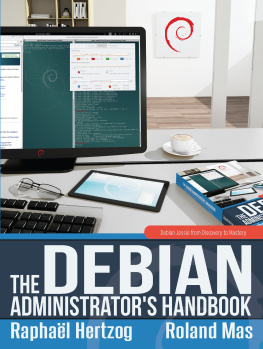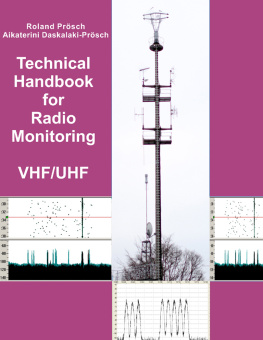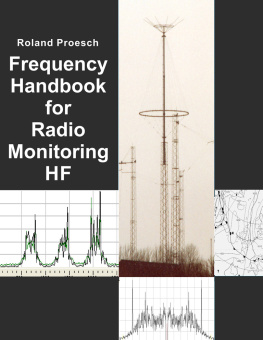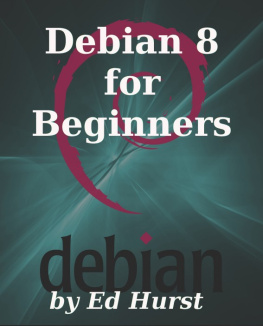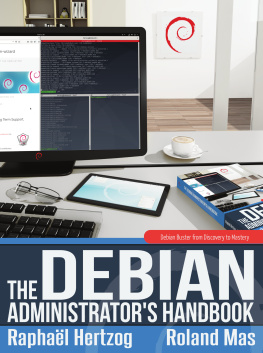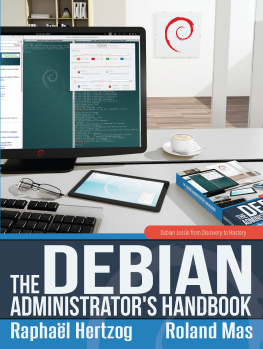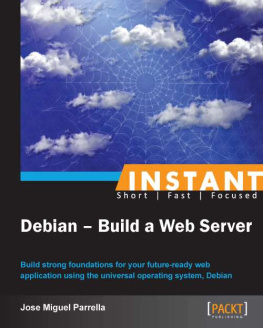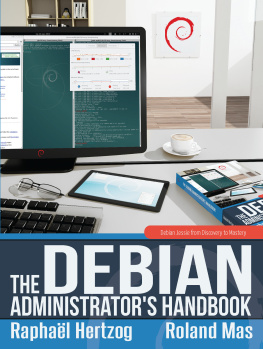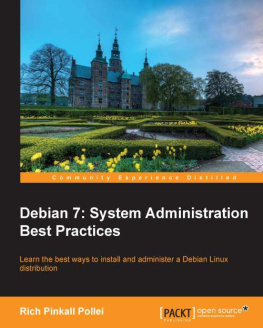Raphaël Hertzog and Roland Mas - The Debian Administrator’s Handbook
Here you can read online Raphaël Hertzog and Roland Mas - The Debian Administrator’s Handbook full text of the book (entire story) in english for free. Download pdf and epub, get meaning, cover and reviews about this ebook. year: 2015, genre: Romance novel. Description of the work, (preface) as well as reviews are available. Best literature library LitArk.com created for fans of good reading and offers a wide selection of genres:
Romance novel
Science fiction
Adventure
Detective
Science
History
Home and family
Prose
Art
Politics
Computer
Non-fiction
Religion
Business
Children
Humor
Choose a favorite category and find really read worthwhile books. Enjoy immersion in the world of imagination, feel the emotions of the characters or learn something new for yourself, make an fascinating discovery.
- Book:The Debian Administrator’s Handbook
- Author:
- Genre:
- Year:2015
- Rating:5 / 5
- Favourites:Add to favourites
- Your mark:
- 100
- 1
- 2
- 3
- 4
- 5
The Debian Administrator’s Handbook: summary, description and annotation
We offer to read an annotation, description, summary or preface (depends on what the author of the book "The Debian Administrator’s Handbook" wrote himself). If you haven't found the necessary information about the book — write in the comments, we will try to find it.
The Debian Administrator’s Handbook — read online for free the complete book (whole text) full work
Below is the text of the book, divided by pages. System saving the place of the last page read, allows you to conveniently read the book "The Debian Administrator’s Handbook" online for free, without having to search again every time where you left off. Put a bookmark, and you can go to the page where you finished reading at any time.
Font size:
Interval:
Bookmark:
<><>Copyright 2003, 2004, 2005, 2006, 2007, 2008, 2009, 2010, 2011, 2012, 2013, 2014, 2015 Raphal Hertzog
Copyright 2006, 2007, 2008, 2009, 2010, 2011, 2012, 2013, 2014, 2015 Roland Mas
Copyright 2012, 2013, 2014, 2015 Freexian SARL
ISBN: 979-10-91414-04-3 (English paperback)
ISBN: 979-10-91414-05-0 (English ebook)
This book is available under the terms of two licenses compatible with the Debian Free Software Guidelines.
Creative Commons License Notice: This book is licensed under a Creative Commons Attribution-ShareAlike 3.0 Unported License.
GNU General Public License Notice: This book is free documentation: you can redistribute it and/or modify it under the terms of the GNU General Public License as published by the Free Software Foundation, either version 2 of the License, or (at your option) any later version.
This book is distributed in the hope that it will be useful, but WITHOUT ANY WARRANTY; without even the implied warranty of MERCHANTABILITY or FITNESS FOR A PARTICULAR PURPOSE. See the GNU General Public License for more details.
You should have received a copy of the GNU General Public License along with this program. If not, see http://www.gnu.org/licenses/.
This book is published under a free license because we want everybody to benefit from it. That said maintaining it takes time and lots of effort, and we appreciate being thanked for this. If you find this book valuable, please consider contributing to its continued maintenance either by buying a paperback copy or by making a donation through the book's official website:
A reference book presenting the Debian distribution, from initial installation to configuration of services.
Debian is a very successful operating system, which is pervasive in our digital lives more than people often imagine or are aware of. A few data points will suffice to make this clear. At the time of writing Debian is the most popular GNU/Linux variant among web servers: according to W3Techs, more than 10% of the web is Debian-powered. Think about it: how many web sites would have you missed today without Debian? Onto more fascinating deployments, Debian is the operating system of choice on the International Space Station. Have you been following the work of ISS astronauts, maybe via the social network presence of NASA or other international organizations? Both the work in itself and the posts about it have been made possible by Debian. Countless companies, universities, and public administrations rely on Debian daily for their operations, delivering services to millions of users around the world... and its orbit!
But Debian is much more than an operating system, no matter how complex, featureful, and reliable such a system could be. Debian is a vision of the freedoms that people should enjoy in a world where more and more of our daily activities depend on software. Debian is born from the cardinal Free Software idea that people should be in control of their computers, and not the other way around. People with enough software knowledge should be able to dismantle, modify, reassemble and share with others all the software that matters to them. It doesn't matter if the software is used for frivolous activities like posting pictures of kittens on the Web, or for potentially life-threatening tasks such as driving our cars and powering the medical devices which cure us and Debian is used in all of the above scenarios; you should control it. People without in-depth software knowledge should enjoy those freedoms too: they should be able to delegate to people of their choice, people they trust, the audit or modification of software-based devices on their behalf.
In the quest for the control of people over machines, Free operating systems play a fundamental role: you cannot be in full control of a computer device if you do not control its operating system. This is where Debian's main ambition comes from: producing the best, entirely Free operating system. For more than 20 years now, Debian has both developed a Free operating system and promoted a vision of Free Software around it. In so doing, Debian has set a very high bar for software freedom advocates around the world. Debian's decisions on matters of software licensing, for example, are routinely looked to by international standard organizations, governments, and other Free Software projects, when deciding if something should be considered free enough or not.
But this political vision is not yet enough to explain Debian's uniqueness. Debian is also a very peculiar social experiment, strongly attached to its independence. Think for a moment of other mainstream Free Software distributions, or even of popular proprietary operating systems. Chances are that you can associate each of them with a large company that is either the main development force behind the project, or at the very least the steward of all its non-development activities. Debian is different. Within the Debian Project volunteers pack on themselves the responsibilities of all the activities that are needed to keep Debian alive and kicking. The variety of those activities is stunning: from translations to system administration, from marketing to management, from conference organization to artwork design, from bookkeeping to legal issues... not to mention software packaging and development! Debian contributors take care of all of these.
As a first consequence of this radical form of independence, Debian needs and relies on a very diverse community of volunteers. Any skill in any of the above areas, or others you can imagine, can be invested into Debian and will be used to improve the project. A second consequence of Debian independence is that Debian's choices can be trusted not to be driven by the commercial interests of specific companies interests that we have no guarantee will always be aligned with the goal of promoting people's control over machines, as too many recent examples in the tech news testify.
One last aspect contributes to Debian's uniqueness: the way in which the social experiment is run. Despite the folklore of being bureaucratic, decision making in Debian is in fact highly distributed. There exist clearly defined areas of responsibility within the project. People in charge of those areas are free to drive their own boat. As long as they keep up with the quality requirements agreed upon by the community, no one can tell them what to do or how to do their job. If you want to have a say on how something is done in Debian, you need to put yourself on the line and be ready to take the job on your shoulders. This peculiar form of meritocracy which we sometimes call do-ocracy is very empowering for contributors. Anyone with enough skills, time, and motivation can have a real impact on the direction the project is taking. This is testified by a population of about 1 000 official members of the Debian Project, and several thousands of contributors world-wide. It is no wonder that Debian is often credited as the largest community-driven Free Software project in existence.
So Debian is quite unique. Are we the only ones noticing this? Definitely not. According to DistroWatch there are about 300 active Free Software distributions around. Half of that (about 140) are Debian derivatives . That means that they start from Debian, adapt it to fit the needs of their users usually by adding, modifying, and rebuilding packages and release the resulting product. In essence, derivatives apply the Free Software granted freedoms of modifying and redistributing copies not only to individual pieces of software, but to a distribution as a whole. The potential of reaching out to new Free Software users and contributors by the means of derivative distributions is huge. We believe that it is mainly thanks to that thriving ecosystem that Free Software is nowadays finally rivaling with proprietary software in fields which were historically considered hard to conquer, such as large desktop deployments. Debian sits at the root of the largest ecosystem of Free Software distributions in existence: even if you are not using Debian directly, and even if your distributor has not told you, chances are that you are benefiting right now from the work of the Debian community.
Font size:
Interval:
Bookmark:
Similar books «The Debian Administrator’s Handbook»
Look at similar books to The Debian Administrator’s Handbook. We have selected literature similar in name and meaning in the hope of providing readers with more options to find new, interesting, not yet read works.
Discussion, reviews of the book The Debian Administrator’s Handbook and just readers' own opinions. Leave your comments, write what you think about the work, its meaning or the main characters. Specify what exactly you liked and what you didn't like, and why you think so.

